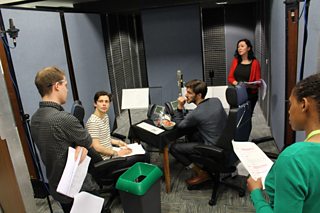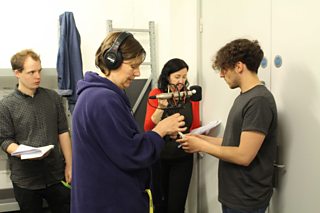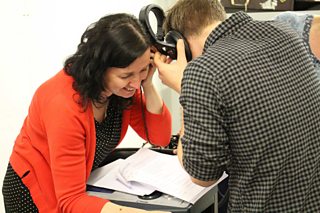Winning the Alfred Bradley Bursary Award - I now feel able to call myself a writer
Piers Black
Writer
Tagged with:
Back in February 2016 my two housemates asked if I wanted them to join me later for the announcement of the winner of the (a biennial competition that supports a writer living in the North with a bursary and the chance of a radio commission). Quietly grateful, I said they could come along, but that we’d sit at the back so we could make a swift exit after saying well done to the winner. I had work early the next morning anyway.
Having spent three months developing my script with radio producer , I felt like I had already been rewarded. I’d learnt a huge amount about narrative, editing, and even myself, and for that I was very grateful. However, there was a big part of me that felt like enough was enough. I’d come a long way, much further than I’d imagined.
Writing was something I did without any bigger idea of what it was. When I felt good, bad, up, down or even absolutely nothing at all, I would write. Sometimes it was for performance, and often it was to be thrown away. What I never felt comfortable with was the question; ‘What do you do?’

Piers with the cast of Human Resources: Ceallach Spellman (Rich), Katie West (Gina), Ashley Margolis (Trainee), Piers Black-Hawkins, Krissi Bohn (Amy) Mathew Baynton (Dylan)
When entering my play into the competition a few months before, it was very much with the attitude of having nothing to lose. As the lists got shorter, and my involvement became more serious, I spent every second trying to soak up what I thought was left of the opportunity. Eventually I found myself being interviewed on the day of the award ceremony, and going in without the usual burden of nerves. I still had nothing to lose.
The Alfred Bradley Bursary Award has changed things. I don’t fear the question any more. ‘I write’ comes much easier as a response, because the award has allowed me to do exactly that. Ironically, writing a play about the anxieties of zero-hour contracts has led to me (almost) being removed from that world. Now, I write. Sometimes it is about the things that make me angry, sometimes it is about the things that confuse me, but always it is written with gratitude. As someone who used to snatch at the spare minutes of the day, I am particularly conscious of what a privilege it is to have been afforded this time to focus. I can see that reflected in my work. Everything offered by Alfred Bradley, his family, and the 主播大秀, has allowed my writing to develop in a way that it wouldn’t have been able to otherwise. So today, I write with gratitude, to say thank you.

Piers, Ceallach Spellman (Rich), Mathew Baynton (Dylan), Nadia Molinari (Director) Krissi Bohn (Amy)
Having just recorded , I wanted to highlight the three most astonishing aspects of the experience.
Number One: The Speed
It flies by! Having written largely for theatre, I have grown accustomed to the time and space given to that creative process; character development, backstory, improv' etc and all the other tools that feel essential for the theatre practitioner in order for them to realise a piece on stage.
Radio drama politely bypasses these requirements for a much more direct approach.
After a read-through in the morning, director Nadia Molinari and the cast got straight on their feet and into the first scene. With scheduling allowing for only a handful of takes, the pace of the day was fast and deliberate. And the outcome was far beyond what I could have expected. Thanks to the ingenuity of the actors and the passionate skill of the director, the result was incredibly immediate and responsive. In a world much closer to film, this process caught the live energy of the day, and propelled it forward with the dedication of all involved.

Recording Human Resources: Piers, Sharon Hughes (Studio Manager), Nadia Molinari (Director), Ashley Margolis
Number Two: The Sound
In a medium that can take you half way around the world in a matter of seconds, radio has to find ways of providing an exotic aural soundscape, as well catching the day to day sounds of modern life. Over the course of the day, sound managers Sharon Hughes and John Benton summoned a huge range of different items, backdrops and sensations, and in increasingly creative ways; whether that be chomping an apple into a microphone, or micro-jogging down a corridor.
The sound team added an extra dimension that I hadn’t anticipated. A whole world beyond the words and the actors, that brought the piece to life, and almost always by thinking outside of the box. It was amazing to watch, and even more impressive to listen, as they proved what a powerful tool the ear can be in telling stories.

Nadia Molinari (Director) with writer Piers Black
Number Three: The Team
More of a continuation of the above; the whole team who put the piece together were outstanding. Nadia the director, whose delicate and insightful touch steered the whole process, was also responsible for casting a cracking group of actors. As the time is limited in the studio, it is essential that this part of making the show is done well, as each artist has to nail down their character almost immediately. Thankfully, those on board smashed it out of the park. With a mix of humour, menace and sincerity, each one of them raised the piece beyond what I had imagined when writing at my little desk in my bedroom.
It’s been a privilege to be involved, and I can’t wait to hear the result in full.
Watch advice videos from the Radio Drama team in Salford:
